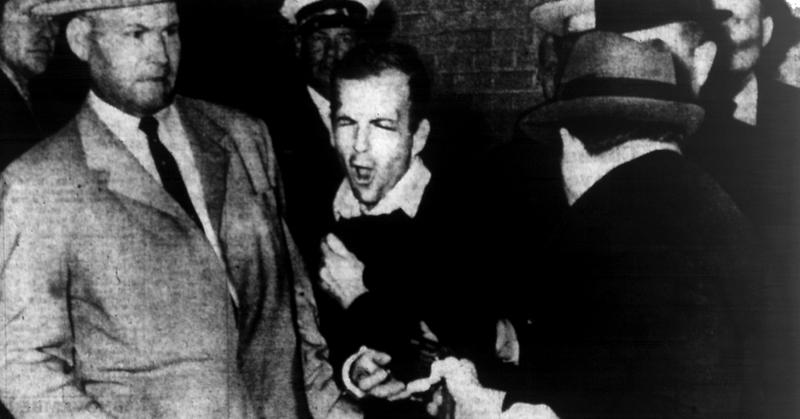Lee Harvey Oswald Was Killed By Jack Ruby, But Why?
By | November 20, 2019

On November 22, 1963, Lee Harvey Oswald assassinated President John F. Kennedy in Dallas; two days later, nightclub owner Jack Ruby shot Oswald in an act of vigilante justice. The story is well known, but, for decades, many people have wondered whether there's more to it. What was Oswald's true motivation, and why did Ruby kill him after he was already in custody of the authorities? The chaos following the assassination and the strange happenings in the years since have left ample fodder for conspiracy theories -- but even the most resolute skeptic has to admit, some things just don't add up.
Villains come in many shapes and sizes. Some parade giant oversized personalities that draw people to their cause. Others cloister themselves as standoffish loners. Lee Harvey Oswald gravitated toward the latter but, despite his infamous act, the life of Lee Harvey Oswald is shrouded in unconfirmed mystery.
The assassination of JFK, decades later, still generates suspicion and skepticism among many people. Even Oswald’s own death at the hands of Jack Ruby evokes more questions than answers. “Facts” on Oswald range from the ridiculous to inane. Nevertheless, here are some noteworthy details about the man who committed the most famous murder in United States history and the man who killed him: Jack Ruby.
From Marine to Commie

In 2019, communism doesn’t inspire the same level of concern that it did in the ‘60s. Back then, communism was a feared ideology that, for many Americans, was an unadulterated evil. Oswald found his appreciation for communism during his tour of duty as a Marine. According to Frontline, marching and cleaning weren’t his favorite duties and in Oswald’s mind awful activities, caused by capitalism.
Reports vary on his level of marksmanship, which turned out to be an important detail, but one agreed-upon fact was that the man found his faith in communism while serving in the United States military abroad.
His Possessions Became Souvenirs After His Death

What would you do with Lee Harvey Oswald's burial plaque? There’s at least one person out there who knows the answer. Shortly after his death, the plaque was stolen. Today it ominously reads just "Oswald." While people may have wanted a piece of history, they didn’t want anything to do with him after death. Due to lack of turnout at his burial, seven reporters helped carry his casket. Somehow we still don’t know the names of all the volunteer pallbearers.
Even the funeral home that handled his remains tried to sell his original coffin for $87,469, which unexpectedly became available after his wife demanded that officials take a closer look at his body to ensure that it was, in fact, Oswald’s body.
Even Oswald's Corpse Inspired Conspiracy Theories

Apparently, his wife, Marina wanted to test the conspiracy theory that a look-alike Russian agent was buried in Oswald’s place. Dental records showed that it was, in fact, Oswald, who had been buried for 20 years.
Unfortunately, for the funeral home, Oswald’s brother sued them for the right to his half-rotted coffin and a judge ruled in his favor. According to the judge, the funeral home engaged in “wrongful and wanton and malicious conduct.” Weirdly, Oswald’s brother destroyed the casket rather than sell it to morbid collectors of U.S history.
Conspiracies On Top Of Conspiracies

Among the many mysteries surrounding Lee Harvey Oswald, the how and why Jack Ruby killed him, stands as perhaps the most confounding. One would think that the President’s assassin would be well protected as there were far more questions than answers surrounding JFK’s death. Before Oswald was handcuffed and taken to court, he and the guard, James Leavelle, even joked about him getting shot!
Here’s Leavelle’s memory of their back and forth, “I put the handcuffs on him and in the process of doing that, I more in jest kind of said, ‘Lee, if anybody shoots at you, I hope they’re as good a shot as you are,’ meaning, of course, that they’d hit him and not me. And he kind of laughed and he said, ‘Oh, you’re being melodramatic,’ or something to that effect. ‘Nobody’s going to shoot at me.'” Oswald died shortly after that conversation.
Many Guesses, Few Answers

According to one of the many sensitive documents released years after the assassination, Jack Ruby asked an FBI informant, on the morning of JFK’s assassination, if he would “like to watch the fireworks.” Ruby “immediately after the shooting, left and headed toward the area of the Dallas Morning News Building, without saying anything to him (the informant).”
Decades later, as many questions swirl around Jack Ruby as Lee Harvey Oswald. Ruby did have recorded mob ties and many speculate that he was involved in a separate plot to kill the President who sought to shut down the mob.
In over 10 years in prison, Ruby never revealed anything about his motive or potential connections. He only ever muttered to a reporter that he was “he was part of a plan to overthrow the government with no details.” He famously claimed that prison doctors injected him with cancer cells.
Nevertheless, Ruby’s mob connections, how he got a gun into the courthouse, and why he killed Oswald all remain mostly a mystery with many tendrils of dubious conspiracy theories linking him to the mob, the Russians, even the CIA. Whatever his reasons, the small-time nightclub owner doesn’t fit very well into the much larger conspiracy theories of why Oswald killed JFK or if he received help from government agencies foreign or domestic.
